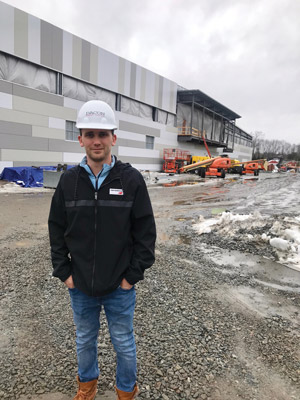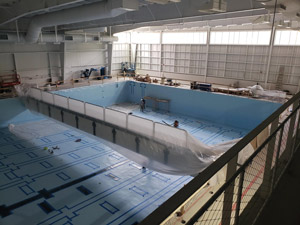Project Profile: Metal Roofing at Boston Sports Institute
The Versatility of Insulated Metal Panels Drives Sport Facility’s Efficient Design in Suburban Boston
Sports facilities are unique environments that face varying environmental conditions from both within and outside the structure. In evaluating building materials, client and builder seek proven solutions for meeting environmental requirements, codes and long-term durability without forsaking the art of design.
Enter the new Boston Sports Institute (BSI), a 130,000 square foot multi-use recreation facility in Wellesley, a suburb of Metro West Boston. A collegiate town and activities hub for surrounding residential communities, Wellesley lacked a professional grade sports facility. Featuring two NHL ice arenas, a synthetic turf field, indoor track, repurposed 2012 Olympic trial pool, warm-up pool, sports rehabilitation area and strength training facility, this $23.3 million complex was completed in July 2019. Centered on a public-private partnership model between the town and the management company Edge Sports Group, BSI prioritizes ice and pool time for local schools who previously traveled to professional facilities. It is also rentable for private organizations and sports groups.
“We were committed to using insulated metal panels from the earliest design stages, both for its performance and design flexibility,” states Kevin Provencher, AIA, LEED AP, Director of Architecture at the design builder Dacon Corporation. “We have a lot of history with this type of product on a variety of building types. It is an effective solution for multi-use facilities with variable environmental requirements. Both ice rinks and natatoriums have high moisture loads, but the ice rink’s temperature will be maintained at 55 degrees Fahrenheit while the pools are at 82 degrees. It’s an ideal wall system for a facility with demanding environmental needs.”
Provencher says insulated metal panels (IMPs) provide a total wall system that incorporates a continuous insulating layer with control layers for weather, air and vapor barriers.
“It helps that we partnered with a quality metal building builder,” Provencher says. “Collaboration was key to this project’s success. Selecting the right details and sharing responsibility eases the burden on the designer.”
Barnes Buildings & Management Group Inc. of Weymouth, Mass., a Metallic Building Company dealer, installed the insulated metal panels from Metl-Span as well as the engineered metal framing system. Tony Barnes oversaw the erection of the metal framing and challenging installation of 58,000 square feet of insulated metal panels. Tim Allison, the Vice President of Project Management at Barnes, oversaw project administration.
“We have a mixture of panel types in multiple colors that run in two orientations,” Allison says. “When we have just one type of panel and one color, we simply unwrap the bundle and install continuously. With multiple colors, you must spread out bundles so we can access the panels in the order needed. With this site, we didn’t have much room, so it was tricky. We paid close attention to the drawings and details to ensure correct installation.”
Allison says Barnes Buildings erects a lot of structures using engineered metal framing systems and IMPs. He’s noticed an architectural trend is using mixed colors and panel orientation to provide a unique aesthetic that is almost impossible to match with other building materials.
Metl-Span’s Smoke Gray, Polar White and Sandstone were installed to create an eye-catching aesthetic. “Our client wanted a strong visual impact on the north façade facing the state highway,” Provencher says. “When passing other commercial buildings commuters notice this vibrant design featuring vertical and horizontal panels. Tim Allison and Marty Barnes provided valuable input, influencing the final outcome.”
There are several unique details to BSI, including a parapet on the gable end of the building above the pool. It starts low at the eaves and grows to 3 feet at the peak to hide rooftop equipment. Barnes Buildings also installed an accent band near the top of the building, a single skin metal panel that continues horizontally from the windows. The 7.2 Rib panel from Metl-Span is 36 inches wide with ribs that are 1-1/2 inches deep.
The roofing for more than 75 percent of the building is a double lock standing seam from Metallic in bare Galvalume. The roofing above the pool is a bare Galvalume insulated metal panel, Metl-Span’s CFR system. It starts approximately 35 feet from the roof peak, so the top section of roofing is standing seam. At the transition to where the IMPs are above the pool, the roofline drops 1 foot. The interior skin on the roofing and wall IMPs in the pool area are coated with Valspar’s Flurothane IV, a finish formulated to protect in exceptionally harsh environments where chemical corrosion protection is needed.
“It’s all things we’ve dealt with on other projects, but there’s a little bit of everything on this one,” Allison says. “It’s a special job and a visually appealing project. The IMPs are ideally suited for our New England climate. When used as walls and roofing, they provide excellent continuous insulation on any building.”
Metl-Span is part of the Cornerstone Building Brands family (NYSE: CNR); delivering high-quality, durable and energy-efficient insulated metal panels designed for unparalleled performance to stand the test of time. For more information on Metl-Span products, call 877-585-9969 or visit www.metlspan.com.
September 24th, 2019 | Roofing Contractor, The Official Publication of The International Roofing Expo







 Wellesley, MA – The Wellesley Sports Center and its managing partner ESG Associates (EDGE Sports Group) announced today that Steward Health Care has acquired naming rights for the new sports complex, and will serve as its physical therapy, strength, and conditioning partner. The facility, scheduled to open this summer, will be named the Boston Sports Institute, a Steward Family Facility, consistent with the key role that Steward will play within the new complex. Steward Health Care will operate a new 6,890 square-foot practice within the facility, offering sports medicine and wellness services. St. Elizabeth’s Medical Center, a Steward Family Hospital, will be the facility’s official hospital.
Wellesley, MA – The Wellesley Sports Center and its managing partner ESG Associates (EDGE Sports Group) announced today that Steward Health Care has acquired naming rights for the new sports complex, and will serve as its physical therapy, strength, and conditioning partner. The facility, scheduled to open this summer, will be named the Boston Sports Institute, a Steward Family Facility, consistent with the key role that Steward will play within the new complex. Steward Health Care will operate a new 6,890 square-foot practice within the facility, offering sports medicine and wellness services. St. Elizabeth’s Medical Center, a Steward Family Hospital, will be the facility’s official hospital.

